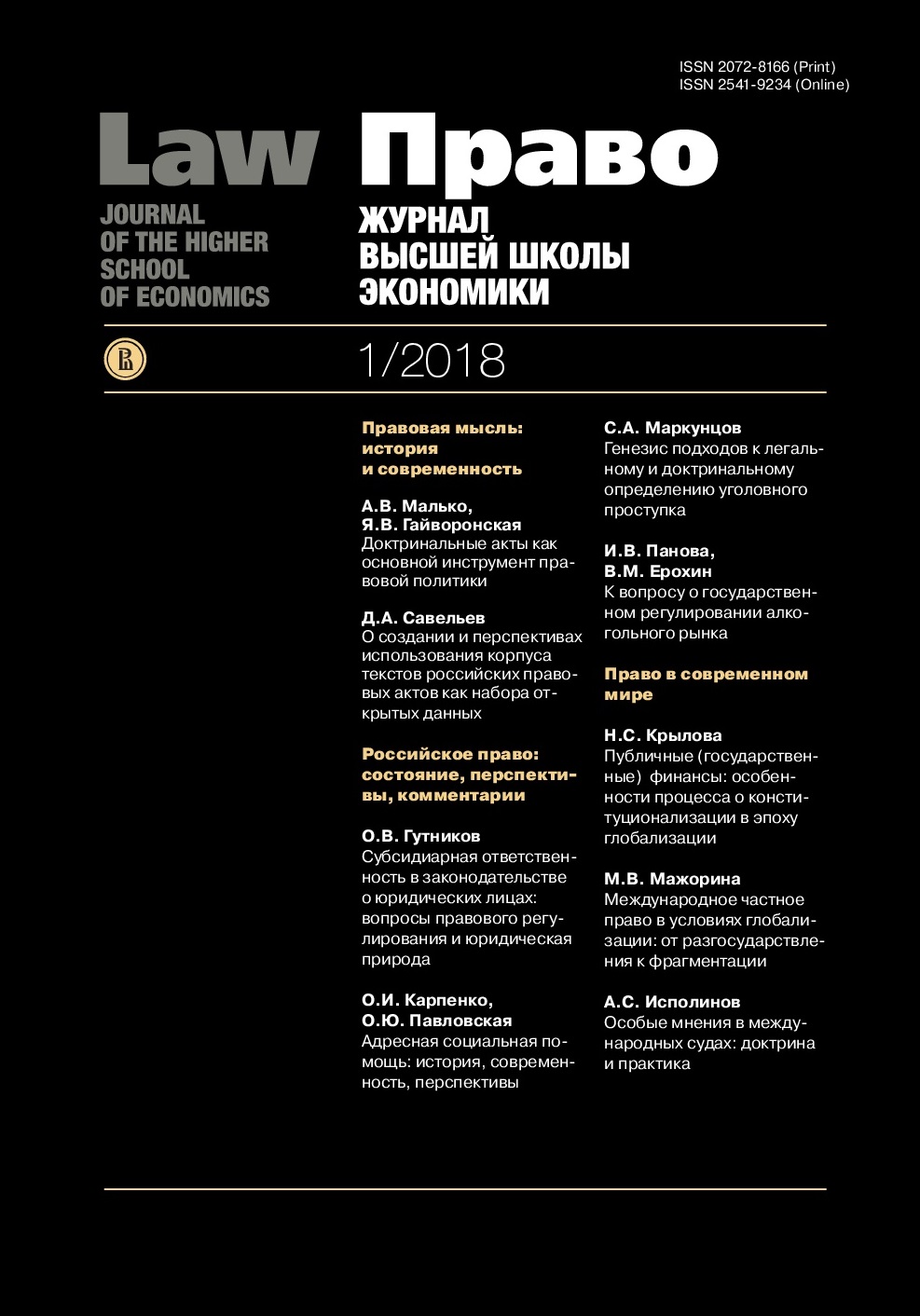Международное частное право в условиях глобализации: от разгосударствления к фрагментации
Аннотация
Глобализация изменила облик мира, породила перестройку социума, трансформацию государства и его суверенитета и привела к «разгосударствлению» права. Наибольшим изменениям подвержено сегодня международное частное право, где наблюдаются: увеличение числа субъектов нормотворчества и адхократический характер последнего; усиление и видоизменение процесса делокализации права; стандартизация и поиск новой правовой идентичности; беспрецедентное разрастание массива норм негосударственного регулирования и поиски путей их легитимизации; активное развитие альтернативных негосударственной и надгосударственной систем разрешения трансграничных споров; парадигмальные сдвиги в области правопонимания, обусловленные интерпретацией понятия «нормы права»; актуализация института автономной правовой квалификации и пр. Разгосударствление права способствует его фрагментации, которая в рамках международного частного имеет две области проявления: нормативную и институциональную. Все это порождают эффект «запараллеливания» социальных реальностей, при котором формируются коллидирующие системы регулирования трансграничных отношений и соответствующие им системы разрешения споров, построенные на основе государственного права и негосударственного права. Новый социум и новая цивилизация формируют запрос на новое право, которое находится в поиске своей идентичности. Возникшие в связи с этим доктрины глобального негосударственного права требуют осмысления и концептуализации, а новые виды социальной практики — lex informatica, lex digitalis, lex electronica или lex networkia, lex sportivа, lex constructionis, lex laboris internationalis — нуждаются в адаптации к современной парадигме международного частного права. В статье исследуется многослойная нормативно-плюралистическая архитектура и делаются предположения относительно будущего нормативно-правового ландшафта применительно к трансграничным частноправовым отношениям. Формирующийся миропорядок, в авангарде которого находится глобальная экономика и обслуживающие ее трансграничные частноправовые отношения, по-прежнему регулируется правом, исходящим от государства, но последнее утрачивает регулятивную монополию, а потому требуется переосмысление нормативной надстройки и формирование нового юридического языка, способного осмыслить и объяснить последствия глобализации в правовом поле.
Литература
Basedow J. (2016) Pravo otkrytykh obshchestv — chastnoe i gosudarstvennoe regulirovanie mezhdunarodnykh otnosheniy: obshchiy kurs mezhdunarodnogo chastnogo prava [The law of open societies: private ordering and public regulation in the conflict of laws]. Moscow: Norma, 382 p. (in Russian)
Berger K. (2010) The creeping codification of the new lexmercatoria. Dordrecht: Kluwer Law International, 464 p.
Castells M. (2010) The information age. Economy, society, and culture. The rise of the network society. N.Y.: Wiley, 656 p.
Cohen J. (2012) Globalization and sovereignty: Rethinking legality, legitimacy, and constitutionalism. Cambridge: University Press, 453 p.
Cotterrell R. (2012) What is transnational law? Law & Social Inquiry, vol. 37, issue 2, pp. 500-524.
Domingo R. (2010) The new global law. Cambridge: University Press, 213 p.
Globalization and Private Law. (2010) Ed. by M. Faure. Cheltenham: Edgar Publishing, 488 p.
Minow M. (2017) Alternatives to the state action doctrine in the era of privatization, mandatory arbitration, and the internet: directing law to serve human needs. Harvard Civil Rights-Civil Liberties Law Review, vol. 52, p. 146-167.
Michaels R. (2013) Dreaming Denationalized Law without a state: scholarship on autonomous international arbitration as utopian literature. London Review of International Law, vol. 1, issue 1, p. 35-62.
Scott C. (2009) Transnational law as a proto-concept. German Law Journal, vol. 10, issues 6/7, p. 859-876.
Sieber U. (2010) A. legal order in a global world — the development of a fragmented system of national, international, and private norms. Max Planck Yearbook of United Nations Law. Vol. 14, p. 1-49.
Twining W. (2000) Globalization & legal theory. Cambridge: University Press, 296 p.
Vedeneev Yu.A. (2017) Yuridicheskaya nauka v sisteme mezhdistsiplinarnykh svyazey [Legal science in the system of interdisciplinary relations]. Lex Russica, no 6, p. 9-31.
Zumbansen P. (2013) Transnational private regulatory governance: ambiguities of public authority and private power. Law and Contemporary Problems, vol. 76, p. 117-138.
Zumbansen P. (2012) Transnational comparisons: theory and practice of comparative law as a critique of global governance. Comparative Research in Law & Political Economy. Research Paper, no 1, p. 1-2.
Copyright (c) 2018 Право. Журнал Высшей школы экономики

Это произведение доступно по лицензии Creative Commons «Attribution-ShareAlike» («Атрибуция — На тех же условиях») 4.0 Всемирная.


















